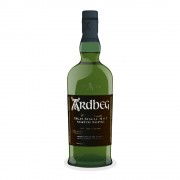Ardbeg Supernova 2014 Committee Release
To Free or Not Too Free?
0 891
RReview by @Rigmorole

- Nose~
- Taste~
- Finish~
- Balance~
- Overall91
Show rating data charts
Distribution of ratings for this:
I'm writing my review of a most DELICIOUS RARE whisky on the eve of a very auspicious event in indeed, which very well might affect the future creation & distribution of my very favorite beverage: namely SCOTCH!
Here are my tasting notes on the latest Supernova:
Nose: Burning driftwood fire, citrus fruits, black Jamaican coffee, lemon rind, vanilla bean, Pine Sol cleaner, All Spice, lovely oily industrial overtones that cannot be done justice by metaphors. An acquired taste, to be sure, that is so abundantly present in this superb bottling.
Palate: Oh that Ardbeg peat! It's hauntingly pungent in the best of ways. Along with this, I get Chinese pepper, wet moss, pine needles, espresso, iodine, cashews, wint-o-mint, dark chocolate (over 85% cacao), smoky roasted hot chilies, and a return of the tar-like fury of Ardbegian peatessence. Oh lordy, I'm in heaven now!
Finish: Ferry boat pylons and seawater, creosote, thick juicy back bacon cooked to a crisp on an iron skillet, smoky pipe with natural tobacco, fennel, very pleasant lingering mouth feel that stays and stays. I love the way the meatiness comes out in the finish. Brilliant that!
Speaking of food for thought, a few weeks ago, I very much enjoyed hearing Ralfy's commentary on the subject of Scottish independence.
As for David Bowie's comment, "Scotland Stay with Us," which was read by Kate Moss at the Brit Awards, well . . . I wasn't at all surprised to hear his point of view. After all, Ziggy Stardust, Bowie, et al, has worked all his professional life on behalf of cultural programmers that hail from Orwell's infamous Oceania. Half a century's worth of propaganda and also brilliant song writing from David Jones's "British invasion" certainly extended and still extend into the whole wide world, picking up speed in most of the English speaking nations.
I've sometimes wondered how many songs Bowie actually wrote himself. A charmed life that man's led. In me mind's eye, I picture a cadre of government shrinks and behavioralists, along with a bevy of talented subcontracted song writers, helping to create Bowie's psychologically primed lexicon, as well as his musical cannon.
As for Kate Moss, I sat next to her in the early 90's at Max Fish, an East Village bar in New York City. She looked bedraggled at the time, hardly runway material. I didn't say a word to her but it was somewhat eerie and also thrilling to see her up close for the length of time it took to drink my beer.
Moss was going through a rough patch then, if the tabloids are to be believed, and I was quite impressed that she would sit in the middle of a bar filled with NYC bohemians, some of whom were outright animals capable of nearly anything. Then again, NYC was known then for leaving celebrities alone to a surprising extent. I'm sure Moss's look was partly a disguise to keep her from being recognized. Nobody that I could see was talking to her. She drank alone in a bar packed with people, which was not only brave for a celebrity of her stature but also quite sexy in a shabby chic way.
Actually, Kate Moss looked much better at the Brit awards just recently. She has aged very well indeed, as has Bowie, who was born in 1947, a few years after me dear old dad.
Bowie walked in front of me with his entourage at a Cycle Sluts from Hell concert, also in early 90's. I recognized the silhouette of his profile instantly. When I told me friends that Bowie had parted the sea of leather babies and sweaty one-generation-too-late punk wannabees nobody believed me until rumor spread about twenty minutes later that he was seated in a special balcony above us along with his entourage.
In all fairness, Bowie's music was a huge influence on my musical tastes, not in my teens, but rather in my early 20's, weirdly enough, when his sound enjoyed a resurgence that went along well with the emo side of grudge. Bowie is a masterful performer, as is Mick Jagger. Both of them are quite convincing as artists cum propagandists. Very powerfully believable, much to their credit, even right down to Bowie's latest comment at the Brit awards, which most likely was not even penned by Bowie himself, but who cares after all? The quote sounded so touchingly heart felt!
As Ralfy so aptly pointed out, Scotland is one of the few countries that discovered huge quantities of oil off its shores and then became poorer.
The other country of note? Haiti. After oil was discovered there off the shores of this island nation, one disaster after another struck, not least of which was the spread of cholera imported by disaster aid nonprofits. I'm sure that was totally an accident. Ironically, and tragically, the cholera epidemic killed far more people than the earthquake. Let's hope some sort of weird and untimely disaster does not befall Scotland if the people vote for independence. These things have a way of accidentally happening whenever billions upon billions upon billions of pounds are at stake. . . .
Speaking of cold hard cash, if you can find a bottle of Ardbeg 2014 Supernova, BUY IT. Yes, it's a bit overpriced, but it's worth ever last ha'penny, not to mention each pound!
And even if you hate Ardbegs the blessed green bottle is already a collector's item. Me? I opened mine, and I don't regret the decision. Not one little bit. My plan is to drink it faster rather than slower. And now I shall experiment with water, a few drops of which are most welcome in this 110 proof glass of Orc-like rebelliousness: "Fiery the angels rose and as they rose deep thunder rolled around their shores, indignant, burning with the fires of Ardbeg Supernova."
As for Scotland, "To be free or not to be free, that is the question." Then again, who's really free these days in the era of all things global? You'd have to live in a cave to be free, living off highland peat water and sun-warmed meadow muffins? Well, I for one would vote "yes," but nobody cares much about the opinion of a Yank when it comes to Scottish independence.
And now, time for another hit of the Supernova. Glug, glug, glug! Actually, I was fairly lit, thanks to the brilliance of Ardbeg's latest (albeit limited) offering, when I penned this whisky review. My apologies. Never drink too much as you type about what to drink. It's something of an oxymoron. I just can't seem to stop drinking the blessed stuff that is Ardbeg. . . . one more sip and I shall be speechless
Find where to buy Ardbeg whisky





Ralfy weighs in on the referendum: www.youtube.com/watch